Who are the key characters?

Leave Taking by Winsome Pinnock has three main characters: Enid Matthews, Del Matthews and Viv Matthews.
There are two secondary characters in the play: an ObeahThe name given to a series of African spell-casting and healing traditions woman called Mai and a close friend of Enidâs called Brod.
All of the characters in the play are fictional, even though the writer, Winsome Pinnock, based some of the events on her own life experiences.


Remember
In your exam you will be asked to write about a character or a theme. If writing about a character, think about including:
Key moments for the character
How the character changes throughout the play
The author's intentions for the character
How an audience might respond to the character.
Enid Matthews
- Proud
- Determined
- Independent
Enid is a Jamaican woman in her forties. She arrived in England in her late teens, leaving behind her family in Jamaica. Enid has raised her daughters Del and Viv on her own.
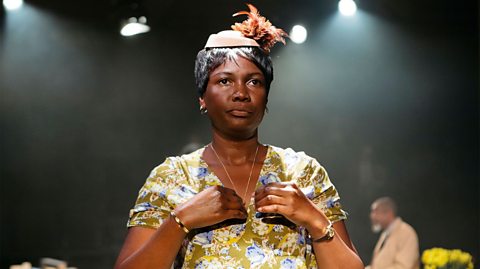
At the start of the play, Enid takes her daughters to visit an Obeah womanA woman who practices Obeah. Obeah is the name given to a series of African spell-casting and healing traditions. (Mai). Enid is worried about her daughters and believes that Mai can use her powers to help. Enid is a deeply spiritual and religious person with strong beliefs and values.
We learn that Enid works two jobs, one as a hospital cleaner. Enid is a proud, hard-working woman who takes care of her family. She does not complain about her situation, and she does not want to discuss any racial tension or discrimination she might have experienced as a Black immigrant. She says:
You come here, you try to fit in. Stick to the rules. England has been good to me. I proud a my English girls.
Enid is determined that Viv and Del should have an easier life than she had. She is extremely proud of Viv, who has the chance to go to university, and worries about Del.
Enid has distanced herself from her childhood in Jamaica. She has brought up Viv and Del to be English and has avoided telling them much about their Jamaican ancestry and culture. Enid slaps Del when Del mocks Enidâs loyalty to English culture and her employers.
Enidâs relationship with her sister in Jamaica is very difficult: Enid thinks her sister is lying to her about needing money. Later in the play, the death of her mother has a profound effect on Enid: she feels guilty about leaving her mother in poverty in Jamaica and conflicted about her motherâs lack of affection.
Enid keeps secrets to protect her children. Enid has told her daughters that their father left them, but Brod tells Del that the racism directed towards Delâs father "turned him from a smiling boy into a hard man". Enid left him after he beat her.
By the end of the play, Enid has accepted the choices made by her daughters for their own lives. She says she wants to be seen and loved, and the play ends with Del tenderly reading Enidâs palm.
Mini quiz
Del Matthews
- Frustrated
- Rebellious
- Cynical
Del is eighteen years old and the eldest of Enidâs two daughters. At the start of the play, she has left school with no qualifications after struggling with dyslexiaDyslexia is a learning difficulty which affects information processing, primarily reading and writing skills, and she has just lost her job at a fast-food restaurant. We soon learn that Del is pregnant and does not want the father involved.
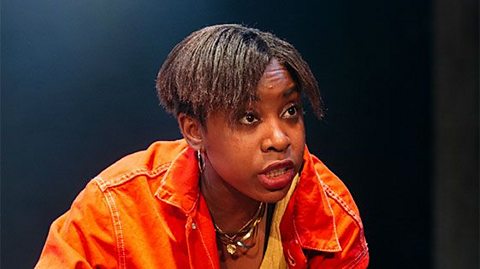
Del is cynicalDistrustful of other peopleâs motives. and resentful about many aspects of her life. She does not want her babyâs father involved with the pregnancy because she believes men are useless parents. In addition, she feels a deep sense of injustice about her treatment as a second-generation immigrant. Del is also frustrated that many jobs are not available to her because of her lack of qualifications.
Del has a very difficult relationship with Enid for most of the play: she believes that Enid hates her. They have an argument in the middle of the play that ends with Del leaving home and moving in with Mai.
Del cares about her sister, Viv. Although they argue and disagree at times, when Del discovers that Viv has walked out of an A-level exam she is furious. She wants Viv to have a better life and not limit her opportunities.
At first, Del is rude and dismissive towards Mai. Del thinks her abilities are nonsense - she calls them "mumbo jumbo" and has very little understanding of the Caribbean culture that Mai represents. Once Del begins to live with Mai, however, she takes an interest in Obeah and appears to have some of the same abilities as Mai. Del works hard to impress Mai and develop her skills.
By the end of the play, Delâs rebellious nature has changed: she has taken on new responsibilities, taken over Maiâs business, and reconcileTo settle an argument and go back to being friendly. with Enid.
Question
What evidence could be used to show how Delâs character changes throughout the play?
| Quote | What this shows about Del |
|---|---|
| "I already know who I am." | This shows Delâs stubbornness and scepticism at the start of the play. She wants to be independent from her mother and not take help or advice from her. |
| "You're too busy bowing and scraping to your beloved England." | This highlights Delâs animosity towards Enid. Del has experienced racism towards her as a Black woman, and she cannot understand Enidâs continued acceptance and defence of English society when her own reality has been so different. |
| "And whereâs walking out gonna get you? A job in a factory?" | This demonstrates Delâs reaction to Vivâs decision to walk out of her exams. Viv expected Del to celebrate her rebellious act, but Del surprises her by acknowledging the value and purpose of Vivâs education. |
| "What if I say the wrong thing? Upset her?" | This concern for Enid in the final scene reflects how Del has changed. Del is nervous about seeing her mother and is also aware of how her words have hurt Enid before. This is a more mature attitude that is reinforced by Delâs reassuring actions in the last stage directions of the play. |
Viv Matthews
- Ambitious
- Diplomatic
- Reflective
Viv is Enidâs youngest daughter. She is taking her A-levels and, unlike her sister Del, she is succeeding academically and plans to go to university.
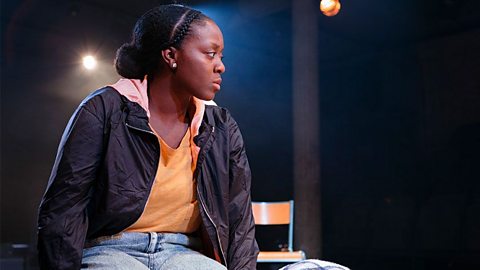
Viv takes a diplomaticDealing with people or situations in a careful and sensitive way. role for most of the play. In the opening scene, Viv calms an argument between Del and Enid. Viv is the one who looks after Enid after they hear that Enidâs mother has died, and Viv is gentle and compassionate when asking questions.
Vivâs identity is linked to her academic achievements. Like Del, she knows very little about their motherâs background and culture. Instead, Viv has embraced English culture and the literary canonA collection of literature that has achieved the status of âclassicâ and is seen as important in wider society. In this particular context, the literary canon is mainly made up of texts by white male writers from before the twentieth century.. Viv proudly quotes from Shakespeareâs plays and the poetry of Rupert Brookean English war poet known for his patriotic and idealistic sonnets, but thinks that travelling to Jamaica could just be a charitable gap year project, and does not know who "Nanny a the Maroonsan eighteenth-century Jamaican woman who led a war against British authorities in Jamaica. She is also mentioned in the poem âChecking Out Me Historyâ by John Agard." is when Brod mentions her.
Viv is aware that Enid is probably keeping secrets from her daughters and curiously questions her mother about her past . Viv is also conscious of how hard her mother works: when Enid hands Viv the money she has saved for Vivâs university studies, Viv realises that Enid "musta bin saving ages" and is reluctant to see herself as worthy of accepting it. Viv later tries to give Del the money to support her with the pregnancy.
After Del leaves home and moves in with Mai, Viv struggles to maintain her relationship with Enid, and her sense of identity is challenged. She expects Del to celebrate her rebellious act of walking out of her English Literature exam, but Del reacts with horror. This causes Viv to reflect on her motivations and purpose.
At the end of the play, we learn that Viv is going to university to pursue a degree in Black Studies.
Mini quiz
Mai
- Resourceful
- Empathetic
- Perceptive
Mai opens the play, with Scene One set in her bedsit in Deptford. She is an Obeah womanA woman who practices Obeah. Obeah is the name given to a series of African spell-casting and healing traditions.. Enid visits Mai whenever she is worried about her family.
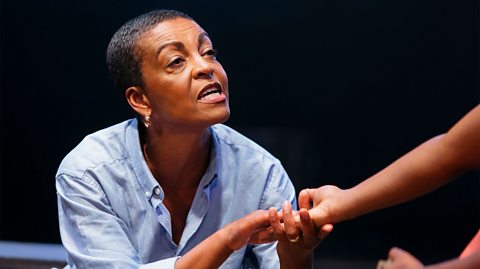
Mai does more than offer spiritual readings: she also asks Enid questions, forcing Enid to reflect on her thoughts and actions. Mai fully embraces her cultural heritage as part of her identity. She shows great empathy towards the other women in the play, and her age and experience ensure that her comments are (mostly) taken seriously.
Mai has an estranged son. When Del moves in with Mai, she is welcomed like she is Maiâs own daughter, with a balance of kindness and strictness. Mai is generous and open-minded, and builds a strong relationship with Del. She teaches Del her Obeah practices, and Del takes on many of Maiâs clients.
Pinnock uses the character of Mai to add some humour to the play, in contrast to the more serious attitudes of the other characters. Mai can find the positives in many situations, and she has a self-deprecatingBeing able to be modest about or make fun of yourself. attitude towards the limits of her powers.
Context: Obeah
What is Obeah?
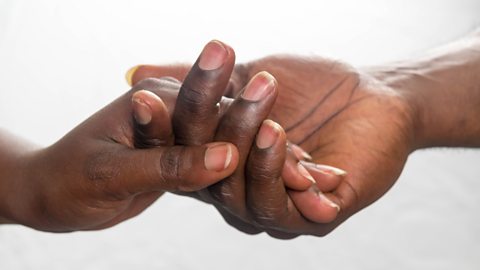
Image caption, Obeah (pronounced oh-bee-yah) is the name given to a series of African spell-casting and healing traditions. Obeah practitioners, known as âObeahmenâ and âObeahwomenâ, are believed to have been âborn with the giftâ of special powers. They often use herbal and animal ingredients to help resolve peopleâs problems and illnesses, and sometimes make predictions for the future.
Image caption, Maiâs status as an Obeahwoman means that Enid feels able to confide in her, and she is a reassuring presence for Enid throughout the play. Some of Maiâs insights and predictions reveal uncomfortable truths. The discussion of Obeah also clearly shows us the cultural knowledge and beliefs of each member of the Matthews family from the start. A traditional belief is that Obeah powers are passed from parent to child. Del symbolically becomes Maiâs daughter, and is able to learn how to practice Obeah. This reinforces their bond and the change in Del.
Image caption, Obeah was banned by British officials in many Commonwealth countries in the 19th century because they thought it was sinister. In the 20th and 21st centuries, there have been some attempts to decriminalise Obeah.
1 of 3
Brod
- Insightful
- Insecure
- Nostalgic
Brod (Broderick) is an old family friend who, like Enid, has also emigrated to England from Jamaica. Unlike Enid, he is open about his struggles with his life in England. Pinnock uses his character as a foilA character who contrasts with another character to highlight key points about them. to Enid.
Pinnock also uses Brod as a tool for expositionInformation about the backstory of a character, setting or event. linked to Enidâs past, revealing information about Jamaica and about Enidâs marriage.

Brod has some strongly-held views: he is unhappy at Enidâs refusal to talk to her daughters about their Caribbean background, and he says that Enid is teaching them "all wrong". He cares about the Matthews family, and actively encourages them to resolve their differences.
Brod is nostalgicFeeling sentimental about the past. for a Jamaican lifestyle. He reminiscesTo think about old memories in an enjoyable way. about Jamaicaâs food, religious values and landscape ("the land a wood and water"). He also feels insecure about his place in England. He has paid ÂŁ50 to become a British citizen, as instructed by the government, but is worried that in the future they will change their minds and deport him. Brod relies on alcohol to deal with these feelings and worries.
The Windrush generation
Brod and Enid are both members of the Windrush Generation. Pinnock has described herself as a "Windrush baby".
After World War Two, people were needed in Britain to fill job vacancies in the cities. Caribbean men and women, many of whom had served in the Royal Air Force and the British Army during the war, were encouraged to move to Britain. The SS Empire Windrush was the first major boat to bring people from Jamaica to London in 1948.
Many of these people took jobs in the armed forces, the NHS and the transport industry. The majority of those immigrants, who were later known as the âWindrush Generationâ, settled permanently in Britain creating new families and communities.
Brodâs anxiety about being deported is an example of Pinnockâs presciencePredicting or seeming to know something in advance.. The UK government did start deporting Windrush Generation immigrants like Brod in 2012, 25 years after Pinnock wrote Leave Taking.
Video
Find out more about the Windrush Generation by watching this video.
Narrator: In 1948 Britain was just starting to recover from the Second World War. Towns and cities had been bombed. Thousands of homes and buildings were destroyed and they all needed to be rebuilt.
In the Caribbean, thousands of men and women had served in the British armed forces. After the war, some of them answered an advert to come to Britain where there were lots of different jobs available.
Other people just wanted to see England, which theyâd heard so much about. They all got on a ship, Empire Windrush, which left the Caribbean to travel thousands of miles across the Atlantic Ocean.
This was the first time so many Caribbean people had come to live in Britain. Many more arrived in the following years.
It was on the 22nd June 1948 that the Empire Windrush arrived at Tilbury Docks in Essex. But when its passengers got off, they found that Britain was not as friendly to them as they had hoped. It was cold and grey and the Caribbean people soon experienced racism and discrimination.
They found it hard to get proper homes to live in and to make friends with British people. Later many of their children were bullied at school because of the colour of their skin.
There were racial attacks an years later, race riots broke out in cities across Britain. Settling in to a new country was difficult and black people had to stick together and support one another.
You can learn more about post-war migration on Bitesize History.
Leave Taking Characters Quiz
Test your knowledge of Leave Taking by taking this multiple-choice quiz.
More on Leave Taking
Find out more by working through a topic
- count3 of 5
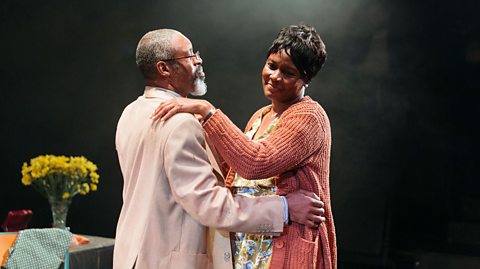
- count5 of 5

- count1 of 5
